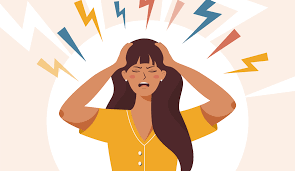Anxiety is a typical emotional condition characterized by emotions of worry, dread, and discomfort. It can be caused by a variety of scenarios, including public speaking, exams, or even meeting new people. However, worry can come for no apparent cause and disrupt normal tasks.
Anxiety is a common mental health disorder that affects millions of individuals worldwide. It might seem like chronic anxiety, fear, and discomfort that disrupt everyday living and relationships, and general well-being. While anxiety disorders are complex, recognizing their underlying causes is critical for successful treatment and support. In this post, we will look at the many elements and causes of anxiety.
Anxiety, like a black cloud towering over our heads, may put a shadow on our lives if not handled. But have you ever pondered what produces this sensation? Is it just psychological, or do biological aspects come into play? In this post, we will go further into the origins of anxiety in order to obtain a better knowledge of why we feel this sensation and how to successfully handle it.

What Are The Causes Of Anxiety
1. Genetic And Family History:
Genetics is a major contributor to anxiety. Individuals with a family history of anxiety problems are more likely to develop anxiety themselves, according to research. Neurotransmitters such as serotonin and dopamine, which play critical roles in mood regulation, can be influenced by genetic factors. Variations in genes involved in stress response and fear conditioning can also increase vulnerability to anxiety disorders.
Biological factors are one of the primary causes of anxiety. Genetics and brain chemistry are two examples. An individual’s risk for anxiety can be impacted by their genetic composition, according to studies, since some genes may make them more prone to acquiring the disorder. In addition, neurotransmitter imbalances such as serotonin and dopamine can lead to anxiety.
2. Brain Chemistry And Neurotransmitters:
Neurotransmitters, or chemical messengers in the brain, play an important role in mood and anxiety regulation. Anxiety can be exacerbated by a neurotransmitter imbalance, notably serotonin, gamma-aminobutyric acid (GABA), and norepinephrine. Low levels of serotonin, the “feel-good” neurotransmitter, for example, can lead to anxiety disorders.
3. Traumatic Life Experiences:
Exposure to traumatic events, such as physical or emotional abuse, accidents, or natural catastrophes, can have a substantial influence on an individual’s mental health. Trauma can cause an increase in anxiety, leading to the development of post-traumatic stress disorder (PTSD) or other anxiety disorders. Traumatic memories and emotional imprints might result in a prolonged sensation of terror and hypervigilance.
4. Personality Qualities:
Certain personality qualities have been linked to a higher risk of anxiety disorders. Individuals with high degrees of neuroticism, which is defined by a proclivity for negative emotions such as dread, worry, and insecurity, are more prone to develop anxiety. Anxiety disorders can also be exacerbated by perfectionism, excessive demand for control, and an overactive feeling of duty.
5. Chronic Medical Illnesses:
The existence of chronic medical illnesses can have a substantial influence on an individual’s mental health, causing worry. Anxiety symptoms can be exacerbated by conditions such as cardiovascular disease, diabetes, chronic pain, and respiratory diseases. Anxiety can be exacerbated by the difficulties of treating a chronic disease, worry about the future, and the impact on everyday functioning.
6. Substance Misuse And Withdrawal:
Substance misuse such as alcohol, narcotics, and certain prescriptions can both cause and exacerbate anxiety symptoms. While medications may give momentary respite, they have the potential to disturb brain chemistry and raise anxiety over time. Furthermore, withdrawal from drugs can create anxiety symptoms as the brain and body adjust to the substance’s absence.
7. Hormonal Abnormalities:
Hormonal abnormalities, especially in women, might have an impact on anxiety levels. Changes in estrogen and progesterone levels during the menstrual cycle, pregnancy, and menopause can all contribute to anxiety. Thyroid problems, for example, can disrupt hormonal balance and lead to anxiety symptoms.

8. Chronic Stress And Lifestyle Factors:
Chronic stress, whether from job, relationships, or other causes, can have a negative impact on mental health and raise the chance of developing anxiety disorders. Anxiety can be exacerbated by unhealthy lifestyle variables such as poor food, lack of exercise, insufficient sleep, and substance misuse. The body and mind are inextricably linked, and ignoring physical health can have serious consequences for mental health.
9. Environmental Factors:
Anxiety symptoms can be triggered or exacerbated by environmental circumstances. Divorce, job loss, and financial troubles are all stressful life situations that can contribute to increased stress and anxiety. Abuse or violence can also have a long-term influence on an individual’s mental health and raise their risk of suffering anxiety.
An individual’s vulnerability to anxiety can be shaped by environmental variables such as upbringing and early life events. Children who grow up in a home with neglect, inconsistent parenting, or high amounts of stress are more prone to develop anxiety problems later in life. Chronic stress, such as financial challenges, work-related pressure, or recurrent confrontations, can also contribute to the development of anxiety disorders.
Furthermore, trauma can significantly alter one’s perception of safety and security, leading one to avoid certain situations or activities altogether. Avoidance behaviors reinforce anxiety because they prevent people from confronting their fears head-on and learning how to cope with them. In addition, negative thought patterns can contribute heavily towards exacerbating anxiety symptoms since they perpetuate a cycle of self-doubt and negativity.
Understanding this interplay between environmental factors and anxiety is crucial in developing effective treatments for those struggling with this condition. Recognizing these triggers may help identify coping strategies that work best for each individual case, without having prolonged periods of discomfort or suffering due to untreated anxieties.
10. Behavioral Factors:
Behavioral variables might play an important role in exacerbating anxiety symptoms. Avoidance habits, such as avoiding events or stimuli that cause anxiety, might, for example, exacerbate the disease over time by preventing people from addressing their anxieties and learning how to manage them successfully.
Furthermore, negative thought patterns such as catastrophic thinking and self-blame can exacerbate anxious feelings and lead to a vicious cycle of worry and suffering.
It is important to note, however, that behavioral variables are only one piece of the jigsaw when it comes to understanding the causes of anxiety. A variety of physical illnesses and drugs might potentially contribute to or worsen this mental health issue. Thyroid issues and some stimulants, in particular, have been reported to increase the chance of developing anxiety or exacerbating existing symptoms.
As a result, it’s critical for people who have chronic anxiety to seek professional help and get an accurate diagnosis, so they may get appropriate therapy that addresses all the underlying causes of their problem.
11. Medical Conditions And Medications:
A multitude of variables, including medical problems and drugs, can contribute to anxiety. Certain medical conditions, such as thyroid abnormalities, can induce or increase anxiety feelings in people. Similarly, stimulants like coffee and nicotine have been shown to cause anxiety in certain people.
It is crucial to understand that when using some prescription medicines, medication-induced anxiety might develop. This might include antidepressants, antipsychotics, and even over-the-counter drugs containing pseudoephedrine, such as cold treatments. It is always advisable to see your healthcare practitioner before making any prescription modifications if you experience greater anxiety while taking them.
While physical disorders and drugs might contribute to the development or aggravation of anxiety symptoms, additional variables such as stresses from everyday life events or negative thought patterns reinforced via behavior must not be overlooked. Individuals can take proactive efforts toward properly controlling their symptoms without depending primarily on pharmacological interventions if they understand the probable causes of anxiety.

Conclusion
Anxiety is a complex mental health condition influenced by interconnected factors. Anxiety disorders are caused by a combination of genetic predisposition, brain chemistry, traumatic events, environmental circumstances, personality traits, chronic medical illnesses, drug misuse, hormone imbalances, and chronic stress. Furthermore, negative thoughts and behavioral habits might exacerbate anxiety symptoms.
Understanding these factors is essential for developing effective preventive, early intervention, and treatment strategies. To improve general well-being and help persons afflicted by anxiety, it is critical to handle anxiety holistically, addressing biological, psychological, and social components. We may learn to control our symptoms and live happy lives via counseling, medication, and lifestyle modifications. With determination and the support of loved ones, we may break free from the bonds of worry and triumph on our road to mental well-being.



